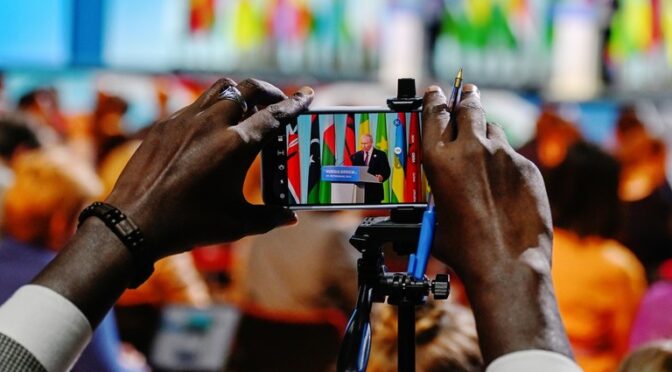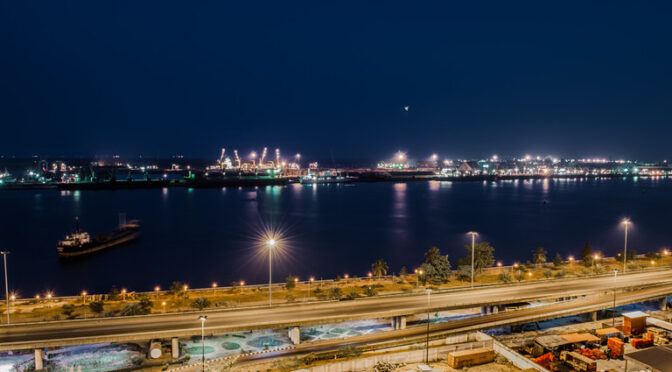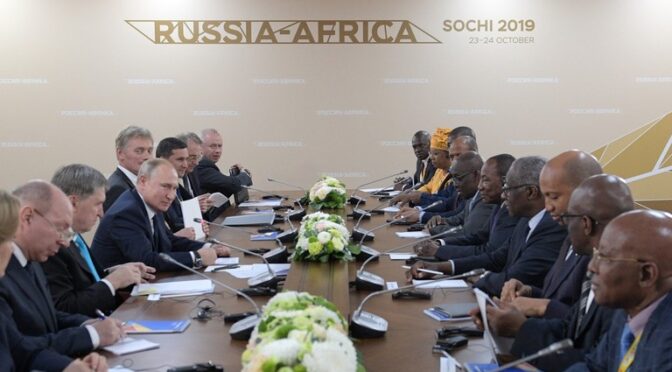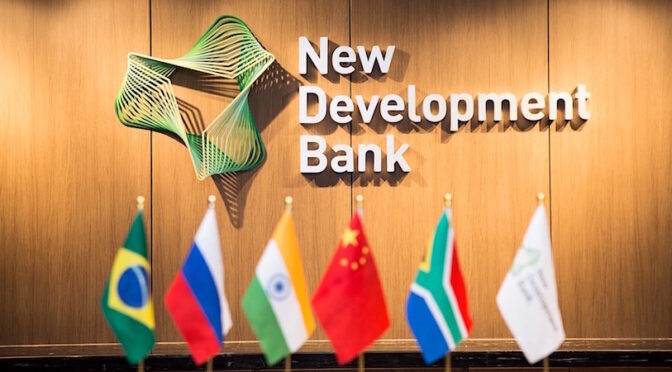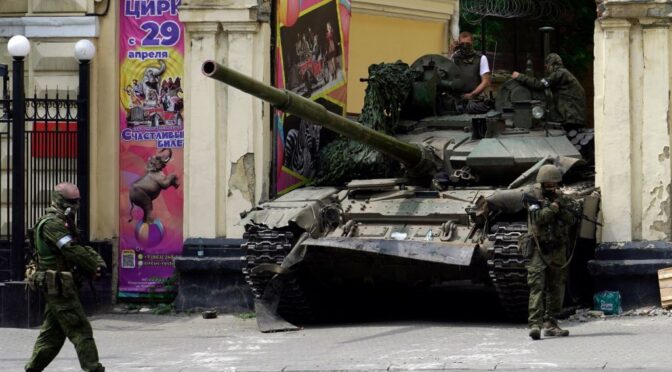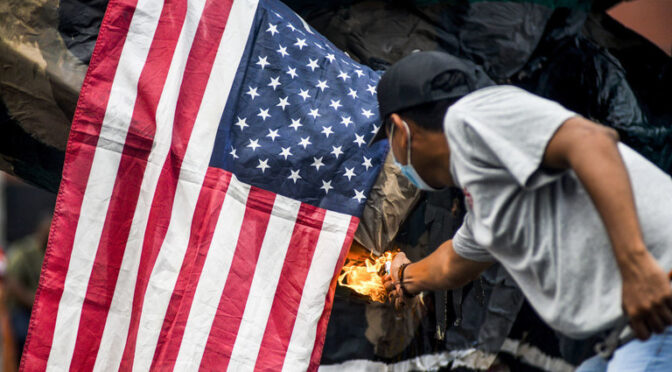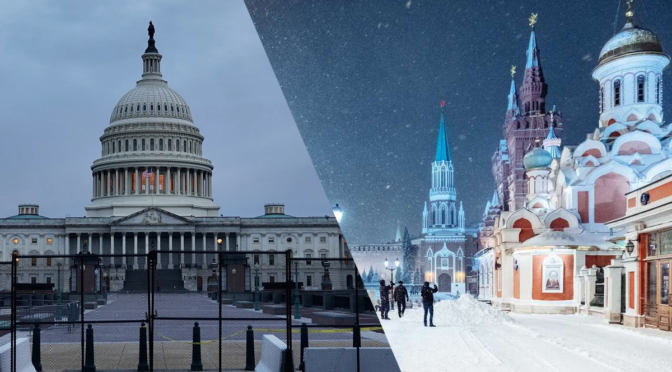In Vladivostok this week, the ‘Russian Far East’ was on full, glorious display. Russia, China, India, and the Global South were all there to contribute to this trade, investment, infrastructure, transportation, and institutional renaissance.
Continue reading In Vladivostok, the Russian Far East RisesCategory Archives: Geopolitics
Russia, North Korea Stage ‘Strategic Coup’ Against Western Hegemony
It will take ages to unpack the silos of information inbuilt in the Eastern Economic Forum in Vladivostok last week, coupled with the – armored – train-keeps-a-rollin’ conducted by North Korean leader Kim Jong-Un straddling every nook and cranny of Primorsky Krai.
Continue reading Russia, North Korea Stage ‘Strategic Coup’ Against Western HegemonyGamed by Zelensky: Ukraine Uses Toxic Pick-up Tactics to Get What it Wants
Kiev has become adept at manipulating its supporters to bend to its whims.
How many times have Ukrainian President Vladimir Zelensky and his entourage dissed their Western friends for not meeting Kiev’s expectations?
In just the latest example, Zelensky adviser Mikhail Podoliak called Western institutions like the International Atomic Energy Agency, the International Red Cross, and Amnesty International “fictitious organizations that pollute our consciousness with absolutely rubbish assessments.” He also attacked the United Nations as a “rather absent organization” and a “public relations office or a lobby office to earn money for a happy old age for people occupying certain leadership positions.”
He’s starting to sound like your average anti-globalist, which isn’t exactly the team that’s sponsoring him.
There’s a pretty easy explanation, though. It’s like when a dude who’s a solid two out of ten on the attractiveness scale wants to get with someone whom he considers to be a solid ten. So in an attempt to cut his object of interest down to his level, he starts making snide little insults suggesting that she isn’t that hot, like, “Hey, did you break your nose, or was it always like that?” It’s a notorious pick-up technique known as ‘negging’.
Ukraine is famously corrupt, and that corruption is routinely evoked as a reason why the EU can’t currently commit to making it a member. Kiev does say, though, that it’ll be ready to join the EU in two years – which is like an arsonist saying they’ll be ready to join the fire department in two years because they’re confident that their fire-starting habit will be squared away by then – even though they just burned down a building last week.
On top of being friend-zoned by the EU, there’s also the fact that NATO won’t make a firm commitment to Ukraine either, beyond using it to get the attention of the true object of its obsessions: Russia. So Zelensky’s entourage has started negging all of these major Western-led institutions, effectively saying, “We’re not corrupt… YOU’RE corrupt! All this talk about dating down and not being able to commit to Ukraine because of your lofty standards, but you’re not exactly great catches yourselves.” That’s the message.
On top of the negging, there’s also been the guilt-tripping. German Foreign Minister Annalena Baerbock wouldn’t cough up the Taurus long-range missiles that Zelensky wanted during a visit to Kiev this week, resulting in Ukraine’s top diplomat accusing Berlin of “wasting time,” and saying Kiev would get the weapons eventually anyway. Baerbock ended up offering €20 million ($21.5 million) as a consolation prize, which should buy Berlin about ten minutes of silence in the same way that parents pay off their mouthy kids with candy so they can watch their favorite TV show in peace and quiet. The root cause of the kid being a demanding, pretentious, spoiled brat is never actually addressed if you just keep appeasing him. And the root cause here is Ukraine’s total unwillingness to negotiate with Russia, with Zelensky saying he is “not interested” in talks with Russian President Vladimir Putin. Instead, Zelensky talks about the problem being “Russia remaining on Ukrainian territory” while totally ignoring the fact that he allowed his country to become a flop house for Washington’s aggressive regime-change interests.
And beyond the negging and guilt-tripping, there have also been the not-so-subtle threats.
Zelensky hasn’t hesitated to threaten the EU while simultaneously demanding entry into it. One reason is that Poland, Hungary and Slovakia have imposed bans on dumping Ukrainian grain into their territory, after a similar EU-level measure expired last week. A glut of grain, which would flood the market and drive down the price of their own farmers’ supply, is particularly an issue for Poland ahead of its national elections this autumn.
“Ukraine is strongly against any further restrictions on the export of our grain,” Zelensky said in response to the continued ban. “Ukraine is fighting for life and for our common European values on the battlefield… if we have to fight for Ukraine and the foundations of our common Europe in arbitration, we will fight… If we need to fight on the platforms of international organizations, we will fight there as well.” Who knew that a guy getting showered with taxpayer cash from the entire Western world would turn out to be such a big defender of free markets? It’s kind of like when Team Zelensky effectively vowed to clean up Wall Street last year by threatening big Western financial institutions, like JPMorgan Chase, Citi, and HSBC, and their managers, with war crimes prosecution for engaging with companies that sell and trade Russian oil or gas or in Russian energy shares, like Gazprom, Rosneft, Lukoil, and Vitol.
And just this week, Zelensky explained in an interview to The Economist that there’s a real danger to the EU from Ukrainians. He told the publication that if he doesn’t get what he wants in terms of aid, Ukrainian refugees might feel abandoned and if they feel “driven into a corner”, they could react unpredictability. No doubt Ukrainian refugees would appreciate Zelensky describing his own people as some kind of sleeper agents who could activate against the EU if he doesn’t get what he wants.
Ukraine and the West are starting to look like a couple that persists in a toxic relationship strictly for appearances, worried about what all the neighbors would say if they ever split, and using each other as much as they can until it all ends in tears – or in World War III.
Putin + Kim Summit: Military Cooperation, Space Exploration, Challenging US Sanctions Together
In a meeting held at the Vostochny Cosmodrome in Russia, Russian President Vladimir Putin and North Korea Chairman Kim Jong Un engaged in extensive discussions.
Continue reading Putin + Kim Summit: Military Cooperation, Space Exploration, Challenging US Sanctions TogetherThe Dark Intentions Behind US Depleted Uranium Ammo Supply to Ukraine
Russia has strongly criticized the US decision to supply Ukraine with depleted uranium ammunition, characterizing it as a blatant display of “inhumanity.”
Continue reading The Dark Intentions Behind US Depleted Uranium Ammo Supply to UkraineThe Third World Revolt vs American Greatness
Although losing a war and taking a blow to prestige can be a painful process, the American people’s interests require the dismantling of the American empire.
Continue reading The Third World Revolt vs American GreatnessCan American Voters Trust Rising Republican Star Vivek Ramaswamy?
As many Americans are now familiarizing themselves with Vivek Ramaswamy, a smooth-talking Republican candidate who is quickly climbing in the polls, it might be wise to read the fine print on this novice first.
Continue reading Can American Voters Trust Rising Republican Star Vivek Ramaswamy?Victoria Nuland’s Desperate Plea for African Cooperation to Reverse Niger’s Popular Coup!
A South African official met an unprepared and “desperate” Victoria Nuland, begging for local help rolling back the popular coup in Niger. The recent BRICS conference might give Nuland even more to fret about.
Continue reading Victoria Nuland’s Desperate Plea for African Cooperation to Reverse Niger’s Popular Coup!High-Stakes Diplomacy: US Commerce Secretary Arrives in China Amid Escalating Rivalry
US Commerce Secretary Gina Raimondo arrived in China on Sunday evening, undertaking a visit to the world’s second-largest economy as part of the ongoing efforts to manage the intensifying rivalry between the two nations.
Continue reading High-Stakes Diplomacy: US Commerce Secretary Arrives in China Amid Escalating RivalryWelcome to the BRICS 11
‘No mountains can stop the surging flow of a mighty river.’ With the addition of six new members that add geostrategic clout and geographic depth to the once sputtering BRICS, the multilateral institution is now gathering the momentum needed to reset international relations.
Continue reading Welcome to the BRICS 11BRICS’ Bold Expansion: Economic Prospects and Political Tensions on a Global Stage
Experts noted that the expansion of BRICS could bring significant economic benefits to its member countries, despite potential differences among them regarding the group’s role in global politics.
Continue reading BRICS’ Bold Expansion: Economic Prospects and Political Tensions on a Global StageGlobal South Gains Upper Hand: BRICS+ Exceeding the Financial Might of Western-led Groups
Lula disclosed that the expanded coalition from the Global South will considerably exceed the financial might of western-led groups by incorporating six new members.
Continue reading Global South Gains Upper Hand: BRICS+ Exceeding the Financial Might of Western-led GroupsNew Members Announced on Expanded BRICS+
South African President Cyril Ramaphosa announced that the BRICS leaders have made the decision to invite Argentina, Egypt, Iran, Ethiopia, the UAE, and Saudi Arabia to become full members of BRICS. This membership is set to commence from January 1, 2024.
Continue reading New Members Announced on Expanded BRICS+Leaked Documents Reveal Plot to Replace Zelensky with Unexpected Contender
It’s becoming increasingly apparent that there is a concerted effort in the Western sphere to oust Zelensky from his position.
BRICS Summit 2023: World Leaders Unveil Bold Visions for Global Growth and Cooperation
Leaders from the BRICS countries, namely Brazil, Russia, India, China, and South Africa, delivered their speeches on the first day of the BRICS Summit 2023 in Johannesburg, South Africa. During this summit, the leaders discussed their vision for the future of the BRICS group and addressed important global issues.
Continue reading BRICS Summit 2023: World Leaders Unveil Bold Visions for Global Growth and CooperationNeocons and Other Malignancies in the American Body Politic
It is interesting to observe how, over the past twenty-five years, the United States has become not only a participant in wars in various places on the planet but has also evolved into being the prime initiator of most of the armed conflict.
Continue reading Neocons and Other Malignancies in the American Body PoliticAlgeria Shuts Down French Request to Use Airspace for Controversial Niger Operation
Algeria Declines French Appeal to Utilize Airspace for Niger Operation, Disputed by Paris
Continue reading Algeria Shuts Down French Request to Use Airspace for Controversial Niger OperationCentral Asia is the Prime Battlefield in the New Great Game
So long as Russia and China remain the region’s dominant political and economic powers, the Central Asian heartland will remain a US and EU target for threats, bribes, and color revolutions.
Continue reading Central Asia is the Prime Battlefield in the New Great GameChina’s Bold Move: BRICS Aims to Dethrone G7 at Upcoming Summit
China intends to advocate for the transformation of the BRICS alliance into a robust competitor against the G7 during its imminent summit in South Africa, as reported by the Financial Times on Sunday.
Continue reading China’s Bold Move: BRICS Aims to Dethrone G7 at Upcoming SummitSUMMER OF THE HAWKS
Wishful thinking is still the rule among Biden’s foreign policy team, as the slaughter in Ukraine continues. It’s been weeks since we looked into the adventures of the Biden administration’s foreign policy cluster, led by Tony Blinken, Jake Sullivan, and Victoria Nuland. How has the trio of war hawks spent the summer?
Continue reading SUMMER OF THE HAWKSThe West’s Attempt to Create a Ukrainian Scenario in Niger is Faltering
African leaders are not suicidal, unlike their counterparts in Kiev, and are thus less willing to do NATO’s bidding.
Continue reading The West’s Attempt to Create a Ukrainian Scenario in Niger is FalteringNiger is Far from a Typical Coup
Rather than send troops in response to the coup, France and the U.S. seem to favor a “Rwanda” type solution applied in Mozambique earlier this year, writes Vijay Prashad. Only this time ECOWAS would apply force.
Continue reading Niger is Far from a Typical CoupIndia Not Sending G20 Summit Invitation to Ukraine
Indian Foreign Minister Subrahmanyam Jaishankar has restated the stance of New Delhi regarding Ukraine’s potential involvement in the upcoming G20 summit scheduled for September.
Continue reading India Not Sending G20 Summit Invitation to UkraineThe Israel Lobby’s Useful Idiot
To stand up to Israel has a political cost few, including Robert F. Kennedy Jr., are willing to pay. But if you do stand up, it singles you out as someone who puts principles before expediency.
Continue reading The Israel Lobby’s Useful IdiotSoros Going Bankrupt: Open Society Foundations Announce Shocking 40% Staff Cut
George Soros’ Open Society Foundations, now under the control of his son Alexander, will significantly curtail its operations within the European Union.
Continue reading Soros Going Bankrupt: Open Society Foundations Announce Shocking 40% Staff CutUS Military’s Secret Bioweapons Research in Ukraine and China Confirmed by RFK Jr.
The US military allegedly contracted some of its research on biological weapons to the government established by the 2014 coup in Kiev, according to statements made by Robert F. Kennedy Jr., a prospective Democratic candidate for the presidency.
Russia is Setting Up An “AfroVillage”
The Moscow and Tver Regions are preparing to welcome 3,000 families from South Africa. In a rural area situated roughly halfway between Moscow and St. Petersburg, an “African village” is in the works as part of a five-year pilot program initiated by the African International Congress (AIC) in Russia. This project aims to settle a significant number of migrants from South Africa.
Continue reading Russia is Setting Up An “AfroVillage”Maidan ‘Midwife’ Victoria Nuland Deployed to Africa
The new military leadership in the country is aware of the potential dangers of engaging the services of the defense contractor, according to Victoria Nuland.
Continue reading Maidan ‘Midwife’ Victoria Nuland Deployed to AfricaEmerging New Political Order: Niger’s Military Coup d’Etat
The latest political situation unfolded in Niger, the unexpected removal of democratically-elected President Mohamed Bazoum late July and the deepening differences in perception across Africa explicitly shows Africa’s level of political illusions and, practical reality towards attaining unity dimension in Africa.
Continue reading Emerging New Political Order: Niger’s Military Coup d’EtatWhy Niger is A New Front in The Modern Cold War
A coup in a poor African nation is not unheard of, but the modern-day geopolitical context gives it global significance.
Continue reading Why Niger is A New Front in The Modern Cold WarAfrica Rising: Niger Bans Uranium and Gold Exports To France
Niger’s military authorities, who took power in a coup last week, have banned uranium and gold exports to France, with immediate effect.
Continue reading Africa Rising: Niger Bans Uranium and Gold Exports To FranceRussia is Making Its Biggest Geopolitical Shift in 300 Years
The choice of St. Petersburg to host last weeks Russia-Africa summit was no accident. It was a symbolic move.
Continue reading Russia is Making Its Biggest Geopolitical Shift in 300 YearsGeopolitical Chessboard Shifts Against US Empire
The geopolitical chessboard is in perpetual shift – and never more than in our current incandescent juncture.
Continue reading Geopolitical Chessboard Shifts Against US EmpireRussia To Assist Nigeria in Revitalizing Its Steel Industry
The largest steel mill in the African nation was constructed through a collaboration with the Soviet Union. Over the years, Russia has remained a reliable ally for Nigeria, and the two countries have developed a strong government-to-government relationship.
Continue reading Russia To Assist Nigeria in Revitalizing Its Steel IndustryBiden Makes the CIA Director Member of His Cabinet
This is very significant because the CIA, considered to be the Puppetmaster, used to be content playing its game from behind the scenes. However, now it’s front and center, which indicates how significant the threat of losing US hegemony really is for the Deep State, especially under a demented administration facing a lot challenges, nowadays.
Continue reading Biden Makes the CIA Director Member of His CabinetWestern Deep State Panics They Might Lose Indo-Pacific
A significant diplomatic effort aimed at countering Beijing’s influence in the Indo-Pacific region is currently in progress, and it is evident from the simultaneous visits of Western leaders to the once-neglected islands in the area.
Continue reading Western Deep State Panics They Might Lose Indo-PacificHere’s what Russia can offer Africa
Moscow has something extremely valuable to offer countries across the continent.
Continue reading Here’s what Russia can offer AfricaPutin: Joining Russia and Africa Efforts for Peace, Progress and a Successful Future
On July 27–28, St Petersburg will host the second Russia-Africa Summit and Russia-Africa Economic and Humanitarian Forum.
Continue reading Putin: Joining Russia and Africa Efforts for Peace, Progress and a Successful FutureNeocons Want War with China
It was a photo op for the ages: a visibly well-disposed President Xi Jinping receiving centenarian “old friend of China” Henry Kissinger in Beijing.
Continue reading Neocons Want War with ChinaIs this Why Biden Has America Involved in the War in Ukraine?
Joe Biden is a criminal and is compromised! And he is leading us into WW3 because Zelenskyy has proof of more Biden crimes.
Continue reading Is this Why Biden Has America Involved in the War in Ukraine?Multipolar Maneuvering in Indo-Pacific
On Monday, while delivering the keynote address at the annual China Business Summit held in Auckland, New Zealand Prime Minister Chris Hipkins weighed in on the power dynamic in the Indo-Pacific.
Continue reading Multipolar Maneuvering in Indo-PacificRussia Confirms BRICS Will Create A Gold-Backed Currency
The news regarding the BRICS (Brazil, Russia, India, China, and South Africa) implementing their plan to create a new international currency has gained momentum. The currency will be backed by gold, as announced on July 7, 2023.
In a recent meeting in Cape Town, South Africa, the foreign ministers of the BRICS countries, along with representatives from more than twelve nations, emphasized their intention to establish an international trading currency.
This undertaking, involving countries representing around 40 percent of the global population and a combined economic output comparable to that of the United States, has the potential for significant consequences.
Additionally, several other countries, such as Saudi Arabia, United Arab Emirates, Egypt, Iran, Algeria, Argentina, and Kazakhstan, have expressed interest in joining the BRICS alliance.
The main objective of the BRICS countries is to decrease their economic and political reliance on the US dollar, challenging the influence of the US dollar on the global stage. They aim to introduce a new international currency for commercial and financial transactions, replacing the US dollar as the standard means of transaction.
The motivation behind this initiative is clear. The US administration has frequently used the US dollar as a “geopolitical weapon” and engaged in what some refer to as “financial warfare.” Through sanctions and cutting off access to the US dollar capital market and international payment systems, the US has exerted control over enemy nations.
These actions have raised concerns in many non-Western countries, highlighting the political risks associated with holding US dollars. As a result, these countries have started restructuring their foreign reserves by reducing US dollar holdings, diversifying into other currencies, and increasing their gold reserves.
According to the search results, the latest data on gold holdings of BRICS member countries is as follows:
- The BRICS countries have a combined gold reserves of 5,452.7 tons as of the first quarter of 2023, with a market value of around 350 billion US dollars.
- China has quadrupled its gold reserves over the past twenty years, and Russia announced in March 2022 that they were linking the ruble to gold at five thousand rubles per gram and requiring payment for their exports in rubles.
- Several sources suggest that the BRICS countries are exploring the possibility of a gold-backed currency, with a more specific framework potentially being announced during the BRICS summit in South Africa.
- In addition, there have been reports of the BRICS countries mulling the formation of a single gold trade system.
- While the BRICS countries are the second largest owner of gold reserves after the US, it’s unclear whether they have increased their gold holdings in recent years or if there have been any significant changes in their gold reserves.
While specific details about the structure of the new BRICS currency are not yet available, it is worth speculating on potential scenarios. One possibility is the establishment of a new bank, the “BRICS Bank,” funded by gold deposits from central banks within the BRICS alliance. The physical gold holdings would be recorded as assets on the balance sheet of the BRICS Bank and could be denominated as “BRICS gold,” with each unit representing one gram of physical gold.
The BRICS Bank could then provide loans denominated in BRICS gold to exporters and importers. These loans would be funded through credit contracts with holders of BRICS gold, who would transfer their deposits to the BRICS Bank for a designated period in exchange for interest. The BRICS Bank could also accept additional gold deposits from international investors, allowing them to hold interest-bearing BRICS gold deposits.
BRICS gold could potentially serve as international money, an internationally recognized unit of account in global trade and financial transactions. This new de facto gold currency could exist solely as an accounting unit and be redeemable on demand, without the need for physical minting.
However, the successful transition to using BRICS gold as an international trade and transaction currency would likely have significant consequences:
- The demand for gold would likely increase sharply, impacting gold prices not only in US dollars and euros but also in the currencies of the BRICS countries.
- The surge in gold prices would devalue the purchasing power of official currencies, including the US dollar and the BRICS currencies. Prices of goods denominated in these currencies would likely skyrocket, leading to a depreciation of all existing fiat currencies.
- The BRICS countries would accumulate gold reserves, particularly if they maintain trade surpluses. They would be the primary beneficiaries of this currency shift, while countries with trade deficits, particularly the US, would face losses.
The aforementioned points demonstrate the potential disruptive nature of the proposal to create a new international trading currency backed by gold.
The actions taken by the BRICS countries could have a profound impact on the global economic and financial framework, resembling a landslide in terms of changes.
It remains intriguing to observe the approach that the BRICS nations will adopt during their meeting in Johannesburg, South Africa, scheduled for August 22-24.
Finance, Power, Integration: The SCO Welcomes A New ‘Global Globe’
Discussions at the recent SCO Summit in New Delhi now point to the inevitable: The merging of new multipolar organizations and their collective reorganization of global finance.
Continue reading Finance, Power, Integration: The SCO Welcomes A New ‘Global Globe’Iran Becomes the 9th Member of Shanghai Cooperation Organization
The addition of Iran as the ninth full member of the Shanghai Cooperation Organization (SCO), an influential security and trade alliance, has been welcomed by Russian President Vladimir Putin, Chinese President Xi Jinping, and Indian Prime Minister Narendra Modi.
Continue reading Iran Becomes the 9th Member of Shanghai Cooperation OrganizationChina’s Bold Move: Unveiling the Game-Changing Foreign Relations Law that Defies Hegemony
The legislation recently approved in Beijing aims to restore the principles of equality and fairness among all nations, bringing back a system governed by the rule of law.
Continue reading China’s Bold Move: Unveiling the Game-Changing Foreign Relations Law that Defies HegemonyA Matryoshka of Psyops
The secret of a perfect psyop is that no one really understands it. A perfect psyop accomplishes two tasks: it renders the enemy dazed and confused while achieving a set of very important goals.
Continue reading A Matryoshka of PsyopsExposing the CIA Connection in the ‘Chinese Police Station’ Narrative
For months, mainstream media across the Western world – in particular English-language outlets based in the constituent members of the ‘Five Eyes’ global spying network – have been rabidly awash with terrifying news of secret “Chinese police stations” operating the world over.
Continue reading Exposing the CIA Connection in the ‘Chinese Police Station’ NarrativeWhat Happens in Russia After The Longest Day?
Following Wagner’s ‘rebellion’ – which was nothing more than a blatant coup attempt, and a PR stunt demonstrated by Prighozin’s top-notch theatrics – NATO and the Collective West’s excitement over the possibility of Russia descending into chaos and civil war were quickly turned into utter disappointment.
Continue reading What Happens in Russia After The Longest Day?When The Lightning Of History Strikes, Better Cut To The Chase in Our First Draft
When the lightning of History strikes, better cut to the chase in our first draft. Here we go.
Continue reading When The Lightning Of History Strikes, Better Cut To The Chase in Our First DraftWhy the US Sought Secret Talks with Iran
Although the specific details of US-initiated indirect talks with Iran are unknown, Tehran is already reaping billions of unfrozen dollars in rewards. In return, Iran may have promised to temporarily stop enrichment at 60%, a number it already had no plan to exceed.
Continue reading Why the US Sought Secret Talks with IranAmerican Elites Conceding The World is Rebelling Against the US
A former White House official has acknowledged the reality of growing resistance to the country’s imperialism
Continue reading American Elites Conceding The World is Rebelling Against the USGreater Eurasia Replaces “Rules-Based Order”
If you’re counting on Asia’s many new power centers to compete and clash – don’t. The Greater Eurasia Partnership is set to integrate them all – from the SCO, EAEU, and BRICS, to emerging new currencies – in order to replace the ‘rules-based order.’
Continue reading Greater Eurasia Replaces “Rules-Based Order”































